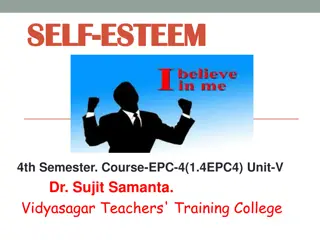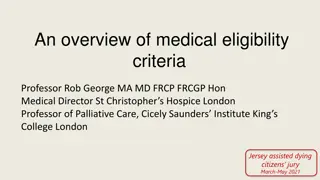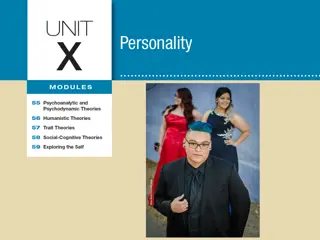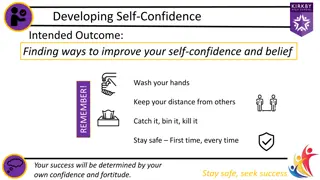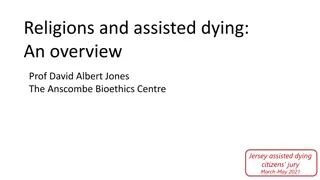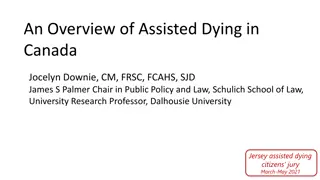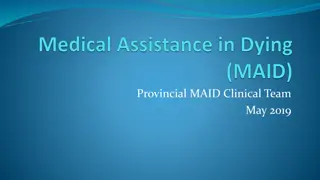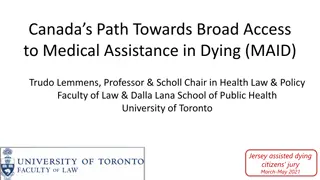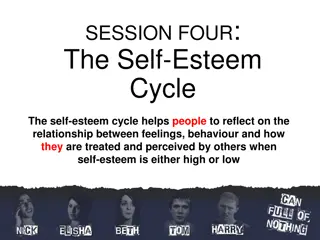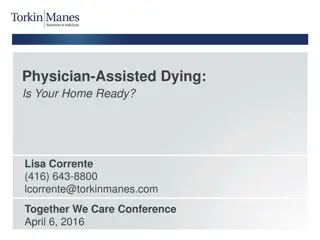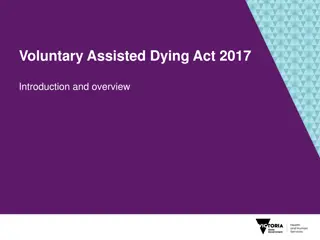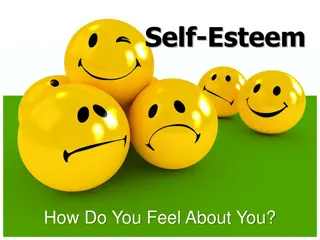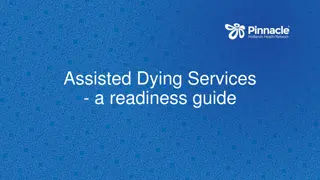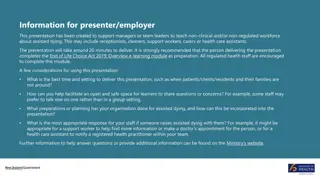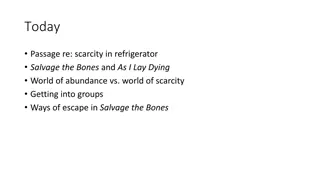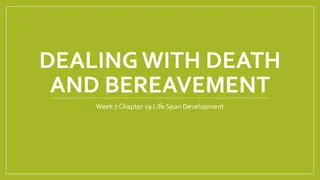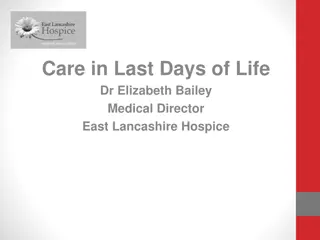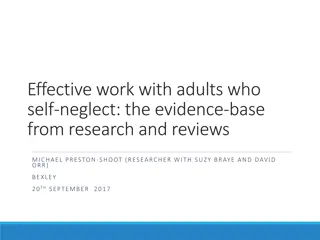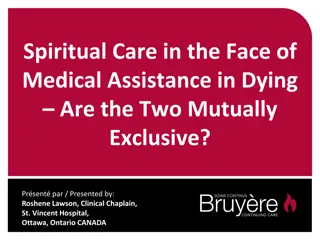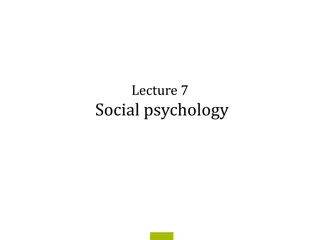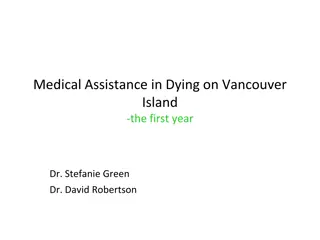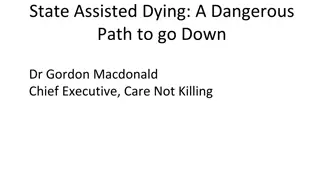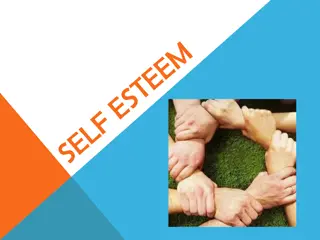Digital Citizenship: Self-Image, Social Media, and Self-Esteem
Explore the impact of social media on self-image and self-esteem. Learn about the influence of filters and media on body perception. Reflect on self-assessment and take-home activities to improve self-confidence.
3 views • 11 slides
Understanding Loss, Grief, and Dying: Insights for Nursing Practice
Delve into the concepts of loss, grief, and dying in healthcare settings. Explore different types of loss, the functions of grief, and nursing interventions for grieving or dying clients. Learn about the signs and symptoms of grief, and discover how to apply the nursing process to support clients an
1 views • 36 slides
Understanding Self-Worth in Children: Building a Strong Foundation
Explore the importance of self-concept, self-esteem, and self-worth in children's development. Learn how parents can positively impact a child's self-perception and self-value through nurturing experiences. Discover the key sources influencing children's self-worth and the critical role of early lif
0 views • 30 slides
Understanding Death and Dying in Human Life
Exploring the interdisciplinary field of thanatology, this chapter delves into the phases of transitioning from life to death, the definition of death in modern society, and how individuals of different ages perceive and cope with the concept of death. It discusses the importance of providing care a
1 views • 10 slides
Understanding Self-Esteem: Meaning, Importance, and Types
Self-esteem is how we perceive our worth and value. High self-esteem leads to confidence and positivity, while low self-esteem can result in self-doubt and negative emotions. Self-esteem impacts mental health, behavior, decisions, relationships, and overall success in life. Recognizing and nurturing
2 views • 15 slides
Understanding Self-Esteem and Ways to Improve It
Self-esteem is our perception of ourselves, impacting how we navigate life. Healthy self-esteem fosters positivity, while low self-esteem can be detrimental. Various factors, like childhood experiences, contribute to low self-esteem, but steps can be taken to improve it. Building positive relationsh
0 views • 14 slides
Insights into Medical Eligibility Criteria for Assisted Dying
Delve into the nuanced considerations surrounding assisted suicide and euthanasia through the lens of medical eligibility criteria, exploring questions on societal implications, definitions of dying, pain assessment, mental states, and the complexities of discrimination in end-of-life decisions.
0 views • 9 slides
Understanding the Self: Psychology's Focus and Implications
The field of psychology has long been intrigued by the concept of self, exploring its importance to well-being, self-esteem, and brain localization. Research reveals how excessive optimism, self-bias, and blindness to incompetence can impact self-esteem. Contrasting individualist and collectivist cu
1 views • 41 slides
Building Self-Confidence: Key Steps and Benefits
Understanding self-confidence, its importance, and how to develop it can lead to enhanced resilience, motivation, reduced fear and anxiety, and a stronger sense of self. Self-confidence allows for confident behavior, while lack of it can lead to self-doubt and avoidance of risks. Learning to embrace
0 views • 7 slides
The Importance of Self-Awareness in Personal Growth
Self-awareness is crucial for understanding one's character, feelings, and motivations. It helps in recognizing strengths and weaknesses, managing stress, improving communication, and fostering empathy. Developing self-awareness involves introspection, mindfulness, self-reflection, and seeking feedb
2 views • 47 slides
Assisted Dying Scenarios and UK Law Overview
Explore scenarios related to assisted dying, including euthanasia, physician-assisted suicide, and treatment withdrawal, within the context of UK law (excluding Scotland). The scenarios depict situations where individuals are facing end-of-life issues and the legal implications of their choices. Lea
0 views • 10 slides
Developing a Self-Care Action Plan for Overall Well-Being
Self-care involves deliberate activities to nurture mental, emotional, physical, and spiritual health, yet it is often neglected. This guide explores the essence of self-care, emphasizes the importance of building a personalized self-care action plan, and provides insights into taking care of your b
0 views • 19 slides
An Overview of Assisted Dying in Oregon and Other U.S. Jurisdictions
The overview discusses assisted dying practices in various U.S. jurisdictions, highlighting the legal framework, terminology changes, and the role of physicians in Medical Aid in Dying (MAiD). It provides a historical timeline of states implementing assisted dying provisions, emphasizing Oregon's De
0 views • 9 slides
Comparison of Assisted Dying Laws in the Netherlands, Switzerland, and Germany
Assisted dying laws in the Netherlands, Switzerland, and Germany vary in terms of legal criteria, processes, and restrictions. In the Netherlands, the Termination of Life on Request and Assisted Suicide Act outlines specific conditions under which euthanasia is allowed. Switzerland permits assisted
0 views • 6 slides
Religions and Assisted Dying: An Overview
Explore the intersection of religions and assisted dying, discussing key aspects such as the meaning of religions, views on death, perspectives on assisted dying across various religious traditions, and the lack of explicit support for assisted dying in most religions. The overview also delves into
0 views • 12 slides
Overview of Assisted Dying in Canada: Legislation, Eligibility Criteria, and Key Points
Explore the journey of assisted dying legislation in Canada, from the landmark Carter v. Canada case to the passage of Bill C-14. Learn about the eligibility criteria, including age requirements, decision-making capacity, voluntary requests, and consent for medical assistance in dying (MAiD). Discov
0 views • 23 slides
Understanding Medical Assistance in Dying (MAID) in Canada
Medical Assistance in Dying (MAID) in Canada allows for self-administered and clinician-assisted options, with specific eligibility criteria based on grievous and irremediable medical conditions. Only physicians can currently provide MAID in Manitoba, respecting conscience-based objections. Eligibil
0 views • 17 slides
Canada's Path Towards Broad Access to Medical Assistance in Dying
Overview of Canada's developments and safeguards in Medical Assistance in Dying (MAID), including key criteria, other safeguards, rhetoric post-Carter decision, and the impact of Truchon v. Canada AG. The introduction of Bill C-7, featuring a 2-track system for different patient scenarios, is discus
6 views • 12 slides
Enhancing Self-Confidence for Professional Success
Understanding the importance of self-confidence in the workplace is crucial for personal growth and career advancement. Self-confident individuals trust their abilities, maintain a sense of control over their lives, and have realistic expectations. This summary delves into the characteristics of sel
0 views • 13 slides
Understanding the Self-Esteem Cycle: High vs Low Self-Esteem
The self-esteem cycle explores the interplay between one's feelings, behavior, and how they are treated based on their self-esteem level. High self-esteem is associated with positive feelings, supportive behavior, and positive interactions, while low self-esteem manifests in negative emotions, withd
9 views • 4 slides
Assisted Dying in Belgium: Legalization, Criteria, and Safeguards
Belgium's journey to legalizing assisted dying, including the key eligibility criteria under the euthanasia law, introduction of palliative care legislation, and the importance of safeguards and processes. Positive and negative experiences, along with key data, shed light on the situation in Belgium
2 views • 28 slides
Enhancing Self-Regulation for Formative Assessment through Social and Emotional Learning
Explore the significance of self-regulation in formative assessment, understand key concepts like self-control, emotional competence, and perseverance. Discover actionable strategies to implement self-regulation interventions with students and train other adults effectively. Future orientation and s
0 views • 25 slides
Understanding Mindful Self-Judgment and Its Role in Mental Health
Mindful self-judgment is a complex concept that involves balancing self-awareness and self-compassion. While nonjudgment is a key aspect of mindfulness practices, there is a debate on whether mindful self-judgment can be appropriate and functional in certain circumstances. Researchers like June Pric
2 views • 46 slides
Exploring Physician-Assisted Dying Laws in Canada
This content delves into the legality and ethical considerations surrounding physician-assisted dying in Canada, examining key legal cases such as Rodriguez v. British Columbia and Carter v. Canada. It discusses the conflicts between the Criminal Code and the Charter of Rights and Freedoms, highligh
0 views • 21 slides
Overview of the Voluntary Assisted Dying Act 2017 in Victoria
The Voluntary Assisted Dying Act 2017 was passed by the Victorian Parliament to provide legal requirements for voluntary assisted dying. It emphasizes respect for autonomy, informed decision-making, quality care, and cultural values. Eligibility criteria include being 18 years or older, an Australia
2 views • 14 slides
Understanding Self-Esteem: Highs and Lows
Self-esteem is the judgment we hold about ourselves, shaped by experiences and relationships. High self-esteem individuals embrace new encounters with confidence and positivity, while low self-esteem individuals struggle with self-doubt and criticism. Recognizing signs of low self-esteem is crucial
0 views • 11 slides
Enhancing Self-Regulation Skills in Children: Strategies and Tips
Understanding and fostering self-regulation in children is crucial for their development. Self-regulation involves controlling impulses, focusing, and shifting between tasks. This article delves into the internal mechanisms of self-regulation, such as executive function, and provides practical tips
1 views • 22 slides
Assisted Dying Services Readiness Guide
Discover how to prepare your practice for providing assisted dying services, including key steps like staff training, policy adaptation, and scenario testing. Learn about eligibility criteria, service overview, and provider options and obligations in this comprehensive guide.
0 views • 15 slides
Boosting Your Child's Self-Esteem & Confidence in Parenting Workshop Series
Understanding self-esteem in children is crucial for their emotional development. Healthy self-esteem leads to positive behaviors, while low self-esteem can result in negative self-perceptions. Recognizing signs of healthy and unhealthy self-esteem allows parents to support and nurture their child's
0 views • 11 slides
Assisted Dying Presentation for Non-Clinical Workforce
Presentation designed to educate managers and team leaders on assisting non-clinical staff with the topic of assisted dying. It covers eligibility criteria, preparation tips, and handling discussions sensitively. Visual resources included for better understanding.
0 views • 15 slides
End-of-Life Decision Making: Legal Perspectives and Medical Aid in Dying
Explore the legal landscape and ethical considerations surrounding end-of-life decision-making, including the issue of medical aid in dying. Thaddeus Mason Pope, JD, PhD, a prominent figure in Health Law, shares insights and references pertinent to the subject. Discover safeguards, clinical criteria
0 views • 7 slides
Exploring Scarcity and Abundance in Literary Works like 'Salvage the Bones' and 'As I Lay Dying'
The passage delves into the stark portrayal of scarcity in a refrigerator, drawing comparisons between 'Salvage the Bones' and 'As I Lay Dying'. It highlights the thematic similarities between Ward and William Faulkner's works, emphasizing the use of symbolism like water and maternal figures. The te
0 views • 13 slides
Understanding Death and Bereavement Across Cultures
Explore the diverse attitudes and customs regarding death, implications of the mortality revolution, coping mechanisms for dying and grieving, and challenges faced in mourning various losses. Delve into cultural perspectives on hastening death and overcoming fear of dying, along with hypothetical qu
0 views • 15 slides
End-of-Life Care Learning Outcomes and Recognition of Dying
Enhance confidence in recognizing end-of-life stages, manage symptoms effectively, understand syringe pump usage, plan care based on priorities, and navigate complicated scenarios. Learn about the North West End of Life Care Model and key signs of dying. Exclusive insights shared by Dr. Elizabeth Ba
0 views • 61 slides
Understanding Self-Neglect in Adults: Challenges and Research Insights
This content delves into the complex issue of self-neglect in adults, covering its definition, key challenges, and the research evidence available. It explores the various aspects of self-neglect, including neglect of self-care, domestic environment, and refusal of services. The challenges associate
0 views • 39 slides
Spiritual Care and Medical Assistance in Dying: Exploring Coexistence
This presentation delves into the intersection of spiritual care and medical assistance in dying (MAiD), questioning if they are mutually exclusive. Presented by Roshene Lawson, a Clinical Chaplain from St. Vincent Hospital in Ottawa, the workshop covers the challenges faced by chaplains post-MAiD l
0 views • 30 slides
Understanding the Self in Social Psychology
Delve into the concept of the individual and the self in social psychology, exploring how identities have evolved historically and the distinction between collective and individual selves. Learn about self-awareness, Wundt's differentiation of I and me, and Higgins' self-discrepancy theory, shedding
0 views • 84 slides
Medical Assistance in Dying on Vancouver Island: A Comprehensive Overview
Dr. Stefanie Green and Dr. David Robertson are key figures in the provision of Medical Assistance in Dying (MAiD) on Vancouver Island, leading with expertise and involvement in relevant associations. Data sources include case reviews, provincial reports, and analysis of MAiD deaths, highlighting Van
0 views • 26 slides
The Dangers of State-Assisted Dying and Euthanasia
State-assisted dying poses significant risks, including pressure on vulnerable individuals, elder abuse, and normalization of suicide. Concerns also include the slippery slope towards including more conditions or groups, opposition from palliative care clinicians, and the increase in state-assisted
0 views • 14 slides
Boosting Self-Esteem: Benefits and Tips for Improvement
Understanding self-esteem, its benefits, and risks of low self-esteem are essential for personal growth. Developing high self-esteem can lead to increased self-respect, goal achievement, and willingness to try new things. On the other hand, low self-esteem can make individuals vulnerable to peer pre
0 views • 10 slides




